| Listing 1 - 10 of 18 | << page >> |
Sort by
|
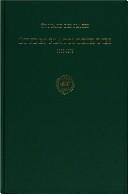
ISBN: 9004064737 9004296468 9789004064737 Year: 1981 Volume: 90 Publisher: Leiden: Brill,
Abstract | Keywords | Export | Availability | Bookmark
 Loading...
Loading...Choose an application
- Reference Manager
- EndNote
- RefWorks (Direct export to RefWorks)
Plato --- 184 --- Philosophy & psychology Platonic --- -Aflāṭūn --- Aplaton --- Bolatu --- Platon, --- Platonas --- Platone --- Po-la-tʻu --- Pʻŭllatʻo --- Pʻŭllatʻon --- Pʻuratʻon --- Πλάτων --- אפלטון --- פלאטא --- פלאטאן --- פלאטו --- أفلاطون --- 柏拉圖 --- 플라톤 --- Addresses, essays, lectures --- -Addresses, essays, lectures --- Plato. --- Aflāṭūn --- Platon --- Platoon --- Платон --- プラトン --- Afl�a�t�un --- Eflatun --- Po-la-t�u --- P��ullat�o --- P��ullat�on --- P�urat�on
Periodical
ISSN: 21834105 20797567 Year: 2001 Publisher: [Place of publication not identified] : International Plato Society
Abstract | Keywords | Export | Availability | Bookmark
 Loading...
Loading...Choose an application
- Reference Manager
- EndNote
- RefWorks (Direct export to RefWorks)
Philosophy, Ancient --- Philosophy, Ancient. --- Plato --- Plato. --- Ancient philosophy --- Greek philosophy --- Philosophy, Greek --- Philosophy, Roman --- Roman philosophy --- Aflāṭūn --- Aplaton --- Bolatu --- Platon, --- Platonas --- Platone --- Po-la-tʻu --- Pʻŭllatʻo --- Pʻŭllatʻon --- Pʻuratʻon --- Πλάτων --- אפלטון --- פלאטא --- פלאטאן --- פלאטו --- أفلاطون --- 柏拉圖 --- 플라톤 --- Платон --- プラトン --- Platon --- Afl�a�t�un --- Eflatun --- Po-la-t�u --- P��ullat�o --- P��ullat�on --- P�urat�on
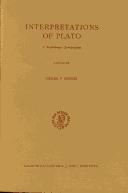
ISBN: 9004052623 9004327673 9789004052628 9789004327672 Year: 1977 Volume: 50 Publisher: Lugduni Batavorum: Brill,
Abstract | Keywords | Export | Availability | Bookmark
 Loading...
Loading...Choose an application
- Reference Manager
- EndNote
- RefWorks (Direct export to RefWorks)
Plato --- Congresses. --- 875 PLATO --- 141.131 --- Griekse literatuur--PLATO --- Platonisme. Neoplatonisme --- -Aflāṭūn --- Aplaton --- Bolatu --- Platon, --- Platonas --- Platone --- Po-la-tʻu --- Pʻŭllatʻo --- Pʻŭllatʻon --- Pʻuratʻon --- Πλάτων --- אפלטון --- פלאטא --- פלאטאן --- פלאטו --- أفلاطون --- 柏拉圖 --- 플라톤 --- Congresses --- -Congresses --- 141.131 Platonisme. Neoplatonisme --- 875 PLATO Griekse literatuur--PLATO --- Aflāṭūn --- Platon --- Platoon --- Платон --- プラトン --- Plato. --- Plato - Congresses --- Afl�a�t�un --- Eflatun --- Po-la-t�u --- P��ullat�o --- P��ullat�on --- P�urat�on
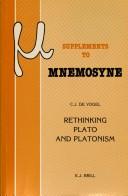
ISBN: 9004087559 9004328270 Year: 1988 Publisher: Leiden ; New York : E.J. Brill,
Abstract | Keywords | Export | Availability | Bookmark
 Loading...
Loading...Choose an application
- Reference Manager
- EndNote
- RefWorks (Direct export to RefWorks)
Neoplatonism --- Alexandrian school --- Church history --- Hellenism --- Philosophy --- Philosophy, Ancient --- Platonists --- Theosophy --- Plato --- Aflāṭūn --- Aplaton --- Bolatu --- Platon, --- Platonas --- Platone --- Po-la-tʻu --- Pʻŭllatʻo --- Pʻŭllatʻon --- Pʻuratʻon --- Πλάτων --- אפלטון --- פלאטא --- פלאטאן --- פלאטו --- أفلاطون --- 柏拉圖 --- 플라톤 --- Neoplatonism. --- Plato. --- Platon --- Platoon --- Платон --- プラトン --- Primitive and early church --- Afl�a�t�un --- Eflatun --- Po-la-t�u --- P��ullat�o --- P��ullat�on --- P�urat�on
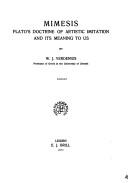
ISBN: 9004035567 900432013X Year: 1972 Publisher: Leiden : Brill,
Abstract | Keywords | Export | Availability | Bookmark
 Loading...
Loading...Choose an application
- Reference Manager
- EndNote
- RefWorks (Direct export to RefWorks)
Aesthetics. --- Beautiful, The --- Beauty --- Esthetics --- Taste (Aesthetics) --- Philosophy --- Art --- Criticism --- Literature --- Proportion --- Symmetry --- Psychology --- Plato. --- Aflāṭūn --- Aplaton --- Bolatu --- Platon, --- Platonas --- Platone --- Po-la-tʻu --- Pʻŭllatʻo --- Pʻŭllatʻon --- Pʻuratʻon --- Platon --- Plato --- Πλάτων --- אפלטון --- פלאטא --- פלאטאן --- פלאטו --- أفلاطون --- 柏拉圖 --- 플라톤 --- Платон --- プラトン --- Radio broadcasting Aesthetics --- Aesthetics --- Afl�a�t�un --- Eflatun --- Po-la-t�u --- P��ullat�o --- P��ullat�on --- P�urat�on
Book
ISBN: 9401208123 9789401208123 9789042035379 9042035374 Year: 2012 Volume: v. 251 Publisher: Amsterdam Rodopi
Abstract | Keywords | Export | Availability | Bookmark
 Loading...
Loading...Choose an application
- Reference Manager
- EndNote
- RefWorks (Direct export to RefWorks)
No new book on Plato can surprise Plato scholars. For there is nothing new under the sun, nor inside the cave. We have grown complacent in our preconceptions of Plato, habitually adopting the web of belief that comes with the canonical corpus. Yet it is not the web itself that stands in the way of progress, but the tendency to adopt it without question. Rethinking Plato is, as the subtitle suggests, a Cartesian quest for the real Plato. What makes it Cartesian is that it looks for Plato independently of the prevailing paradigms on where we are supposed to find him. The result of the quest is a complete pedagogical platform on Plato. This does not mean that the book leaves nothing out, covering all the dialogues and all the themes, but that it provides the full intellectual apparatus for doing just that. It consists of two parts. The first is a general orientation in three chapters, one each pertaining to the life, thought, and works of Plato. The second is a dialogic companion covering the four dialogues built around the last days of Socrates, with a separate chapter devoted to each: Euthyphro , Apology , Crito , and Phaedo .
Aesthetics, Ancient. --- Aesthetics. --- Beautiful, The --- Beauty --- Esthetics --- Taste (Aesthetics) --- Philosophy --- Art --- Criticism --- Literature --- Proportion --- Symmetry --- Psychology --- Plato --- Plato. --- Aflāṭūn --- Aplaton --- Bolatu --- Platon, --- Platonas --- Platone --- Po-la-tʻu --- Pʻŭllatʻo --- Pʻŭllatʻon --- Pʻuratʻon --- Platon --- Πλάτων --- אפלטון --- פלאטא --- פלאטאן --- פלאטו --- أفلاطون --- 柏拉圖 --- 플라톤 --- Платон --- プラトン --- Afl�a�t�un --- Eflatun --- Po-la-t�u --- P��ullat�o --- P��ullat�on --- P�urat�on --- Philosophers.
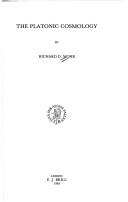
ISBN: 9004072322 9004320644 9789004072329 Year: 1985 Volume: 42 Publisher: Leiden: Brill,
Abstract | Keywords | Export | Availability | Bookmark
 Loading...
Loading...Choose an application
- Reference Manager
- EndNote
- RefWorks (Direct export to RefWorks)
Philosophy of nature --- Plato --- Philosophy, Ancient --- Cosmology, Ancient --- Philosophie ancienne --- Cosmologie antique --- Plato. --- Contributions in cosmology --- ROLDUC-SEMI --- #GROL:SEMI-1-05'-04' Plat --- Ancient cosmology --- -Aflāṭūn --- Aplaton --- Bolatu --- Platon, --- Platonas --- Platone --- Po-la-tʻu --- Pʻŭllatʻo --- Pʻŭllatʻon --- Pʻuratʻon --- Πλάτων --- אפלטון --- פלאטא --- פלאטאן --- פלאטו --- أفلاطون --- 柏拉圖 --- 플라톤 --- Cosmology, Ancient. --- -Contributions in cosmology --- Contributions in cosmology. --- Aflāṭūn --- Platon --- Platoon --- Платон --- プラトン --- Afl�a�t�un --- Eflatun --- Po-la-t�u --- P��ullat�o --- P��ullat�on --- P�urat�on
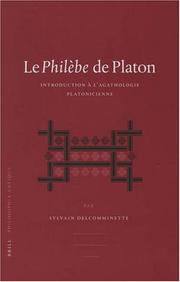
ISSN: 00791687 ISBN: 9004150269 9789004150263 9786611398729 1281398721 9047409132 9789047409137 9781281398727 6611398724 Year: 2006 Volume: 100 Publisher: Leiden: Brill,
Abstract | Keywords | Export | Availability | Bookmark
 Loading...
Loading...Choose an application
- Reference Manager
- EndNote
- RefWorks (Direct export to RefWorks)
This book deals with the nature and function of the good in Plato’s philosophy, by focusing on the dialogue explicitly devoted to it: the Philebus. It provides a comprehensive commentary of this difficult dialogue in which almost all the themes of Plato’s philosophy are discussed or alluded to. The author shows that a scrupulous analysis and reconstruction of its argumentative progress makes it possible to discover the unity between these different topics, and argues that this unity lies in the fact that Plato develops there what he was calling for notably in the Republic, id est a (dialectical) science of the good (or ‘agathology’). Read from this viewpoint, the Philebus appears as a dialogue of tremendous importance for the understanding of Plato’s philosophy as a whole.
Pleasure. --- Plato. --- Plate. --- Pleasure --- Plato --- Good and evil --- Values --- Plaisir --- Bien et mal --- Valeurs (Philosophie) --- Emotions --- Ethics --- Senses and sensation --- Utilitarianism --- Happiness --- Hedonism --- Aflāṭūn --- Aplaton --- Bolatu --- Platon, --- Platonas --- Platone --- Po-la-tʻu --- Pʻŭllatʻo --- Pʻŭllatʻon --- Pʻuratʻon --- Πλάτων --- אפלטון --- פלאטא --- פלאטאן --- פלאטו --- أفلاطون --- 柏拉圖 --- 플라톤 --- Platon --- Platoon --- Платон --- プラトン --- Philebus (Plato) --- Philebos (Plato) --- Morale --- Plate. - Philebus --- Afl�a�t�un --- Eflatun --- Po-la-t�u --- P��ullat�o --- P��ullat�on --- P�urat�on --- Bien (philosophie) --- Platon (0427?-0348? av. j.-c.) --- Platon (0427?-0348? av. j.-c). philèbe
Book
ISSN: 00791687 ISBN: 9789004312005 9004312005 9789004326194 9004326197 Year: 2016 Volume: 143 Publisher: Leiden: Brill,
Abstract | Keywords | Export | Availability | Bookmark
 Loading...
Loading...Choose an application
- Reference Manager
- EndNote
- RefWorks (Direct export to RefWorks)
In Plato on Democracy and Political technē Sørensen argues that the question of democracy’s ‘epistemic potential’ was one that Plato took more seriously than is usually assumed. While he famously rejected democracy on the basis of its inherent inability to accommodate political expertise (technē), he did not think that this failure on democracy’s part was necessarily inevitable but a concept that required further examination. Sørensen shows that in a number of his most important dialogues (Republic, Gorgias, Statesman, Protagoras, Theaetetus ), Plato was ready to take up the question of democracy’s epistemic potential and to enter into strikingly technical and sophisticated discussions of what both rule by technē and rule by the people would have to look like in order for the two things to be compatible.
Democracy --- Political science --- Philosophy, Ancient --- Démocratie --- Science politique --- Philosophie ancienne --- Philosophy --- Philosophie --- Plato --- Political and social views. --- Political aspects --- Political and social views --- Democracy. --- Démocratie --- Self-government --- Equality --- Representative government and representation --- Republics --- Plato. --- Platon --- Aflāṭūn --- Aplaton --- Bolatu --- Platonas --- Platone --- Po-la-tʻu --- Pʻŭllatʻo --- Pʻŭllatʻon --- Pʻuratʻon --- Πλάτων --- אפלטון --- פלאטא --- פלאטאן --- פלאטו --- أفلاطون --- 柏拉圖 --- 플라톤 --- Платон --- プラトン --- Platon, --- Philosophy - Political aspects --- Plato - Political and social views --- Afl�a�t�un --- Eflatun --- Po-la-t�u --- P��ullat�o --- P��ullat�on --- P�urat�on --- Political and social views of a person
Periodical
ISSN: 18725473 Year: 2007 Publisher: Leiden, Netherlands ; Boston : Brill,
Abstract | Keywords | Export | Availability | Bookmark
 Loading...
Loading...Choose an application
- Reference Manager
- EndNote
- RefWorks (Direct export to RefWorks)
Platonists --- Néo-platonisme --- Philosophie ancienne --- Plato --- Platon --- Platonism --- Aflāṭūn --- Aplaton --- Bolatu --- Platon, --- Platonas --- Platone --- Po-la-tʻu --- Pʻŭllatʻo --- Pʻŭllatʻon --- Pʻuratʻon --- Πλάτων --- אפלטון --- פלאטא --- פלאטאן --- פלאטו --- أفلاطون --- 柏拉圖 --- 플라톤 --- Platonists. --- Plato. --- Philosophers --- Philosophy, Ancient --- Néo-platonisme --- Платон --- プラトン --- E-journals --- Neoplatonism --- Ancient philosophy --- Greek philosophy --- Philosophy, Greek --- Philosophy, Roman --- Roman philosophy --- Alexandrian school --- Church history --- Hellenism --- Philosophy --- Theosophy --- Afl�a�t�un --- Eflatun --- Po-la-t�u --- P��ullat�o --- P��ullat�on --- P�urat�on --- Philosophy, Ancient. --- Neoplatonism.
| Listing 1 - 10 of 18 | << page >> |
Sort by
|

 Search
Search Feedback
Feedback About UniCat
About UniCat  Help
Help News
News